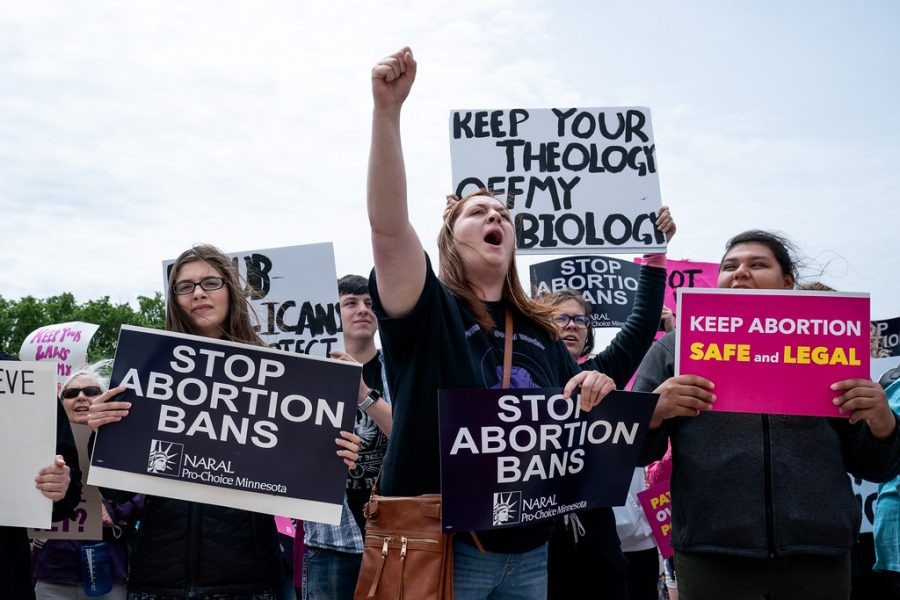Op-ed: Beyond Roe v. Wade
January 20, 2021
Last year, in October, Amy Coney Barrett, a conservative Catholic judge, was confirmed to the United States Supreme Court. In the following days, my news feed was dominated by articles about the landmark supreme court case Roe v. Wade which legalized abortion, a procedure Barrett opposes based on her Catholic beliefs. The New York Times even described Barrett as a “home run by conservative Christians and anti-abortion activists.” Many fear that the new conservative majority on the Supreme Court could potentially overturn Roe v. Wade, dealing a blow to reproductive rights, women’s rights and the very state of our nation. But, with Barrett’s position on the Supreme Court sealed and Joe Biden’s upcoming presidency, I’ve spent my time thinking about something else. Why is no one, especially Democrats, talking about the Hyde Amendment?
The Hyde Amendment, first passed in 1976, “blocks federal funds from being used to pay for abortion outside of the exceptions for rape, incest, or if the pregnancy is determined to endanger the woman’s life, resulting in dramatically limited coverage of abortion under Medicaid and other federal programs.” Year after year, the Hyde Amendment is renewed by Congress. Even though Roe v. Wade has garnered widespread political attention since the case was decided in 1973, the Hyde Amendment is generally unknown to the public. This must change, since the amendment disproportionately impacts people of color and low income — two groups that have the highest rates of unintended pregnancies.
Almost every senator has voted in support of the Hyde Amendment — including President Joe Biden. We should continue to fight for reproductive justice, but we must be armed with further knowledge about the legal structures surrounding the right to abortion in order to support the larger battle against reproductive oppression. Roe v. Wade is vitally important, but women need to be aware of laws that extend beyond Roe v. Wade in order to better advocate for reproductive rights. Ending the Hyde Amendment is the first step in allowing abortion to become accessible for all women. This key piece of legislation needs immediate national attention.
In 2019, Biden opposed the Hyde Amendment. But up until that point, Biden had been a “staunch supporter” of the amendment. Even Barack Obama referred to the Hyde Amendment as “tradition.” Although many people are immensely relieved to have Biden in the White House, we should continue to hold him accountable and pressure him to uphold his stance. Since many people are unaware of the Hyde Amendment and its devastating impact, I am afraid the administration will not prioritize its abolishment. Many Democrats shy away from talking about abortion and standing against the many injustices that plague reproductive health and it is up to us to make sure we no longer go unheard. Abortion is an issue that Democrats give up on first when looking for ways to achieve bipartisanship with Republicans. Although it is tempting to relax knowing that Biden is going to be in power, it’s not the time to let our guard down. It’s the time to be excited about the prospect of change, but also be ready to fight further for what we believe in.
Yes, abortions are legal right now, but only for some people. For millions of people, they are inaccessible because of legal barriers put in place by individual states. And as much as I would like to blame this all on Trump, this issue preceded his inauguration. If the problem is not acknowledged and subsequently stopped, Republicans will try to legislate abortion until it is relatively unattainable for the majority of the population. Mainstream media perpetuates the all-or-nothing message that if Roe V. Wade is kept in place, the war is over. As pro-choice advocates keep focusing on Roe v. Wade as the only critical piece of legislation protecting reproductive rights, right-wing political leaders can keep abortions inaccessible with other provisions like the Hyde Amendment.
Both in and out of the political sphere, women have long been weary of asking for “too much.” But this fear has left many women negligent of vital information, specifically in regards to reproductive rights. I understand that there is so much to fight for. Racial justice, climate change and the income gap are all at the forefront of many people’s minds, especially in today’s contentious social and political climate. Keeping abortion legal seems like enough, and fighting for more can be overwhelming and sometimes seemingly hopeless. In today’s society, no one questions the essentialness of healthcare. For many women, their reproductive, sexual, emotional and physical health are all inherently tied to needing to end a pregnancy. And yet, abortion is still not a term typically associated with healthcare. Abortion is healthcare. Abortion is essential. It grants women freedom over their lives and bodies. If that isn’t something to fight for and prioritize, I don’t know what is.
Sydney Somerville is a third-year communications major. She can be reached at somerville.s@northeastern.edu.






